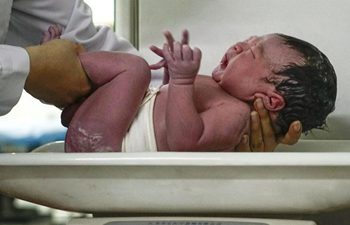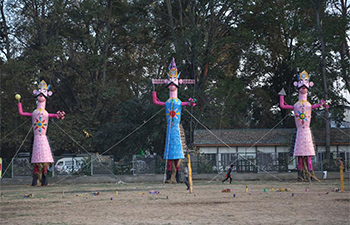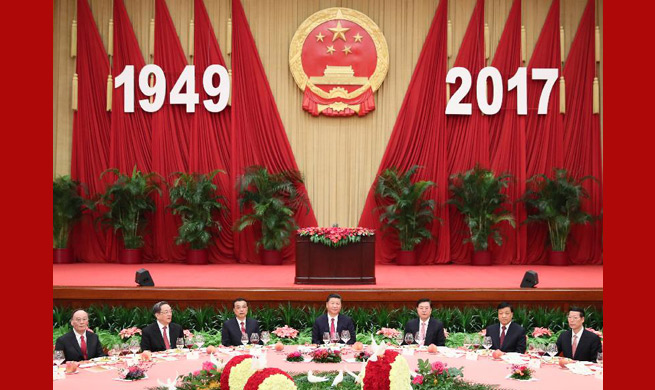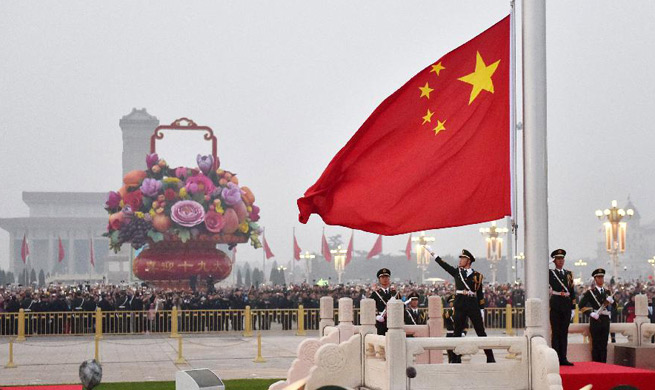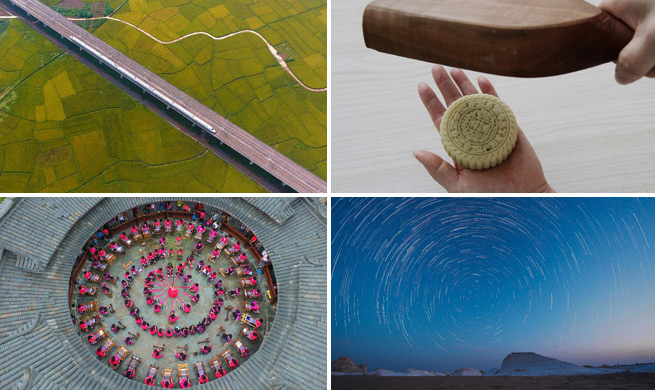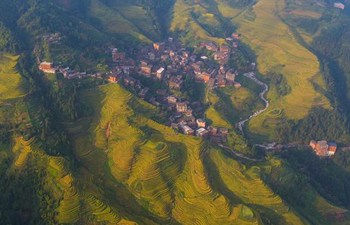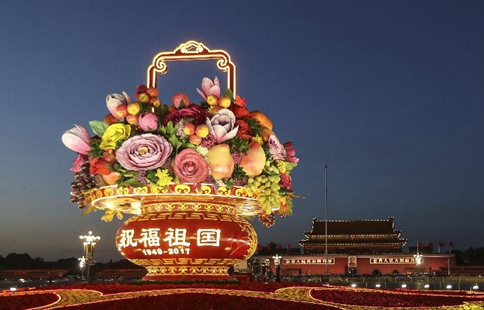by Tamara Treichel
QUFU, China, Oct. 1 (Xinhua) -- "Study the Analects of Confucius if you want to understand China better," a close Chinese friend once advised me.
So before moving to China, I bought a copy of British Orientalist Arthur Waley's translation of the "Analects," and I must say my friend's advice was among the best I have ever received.
The longer I stay in China, the more I realize that this collection of ideas attributed to the Chinese philosopher and educator Confucius (551-479 B.C.) is a "minefield" of wisdom. Ponder Confucius' sayings, and you will be blown away by their profundity and enduring relevance.
Moreover, the more I interact with Chinese people and immerse myself in Chinese society, the more vestiges of Confucianism do I discover in today's China.
For example, when taking public transportation in Beijing, I encounter signs everywhere reminding passengers to give up their seats to those in need, such as the sick and elderly. Some public places like banks and train stations also have designated seats for such persons.
Obviously, benevolence, a typically Confucian virtue, is still very much encouraged in China.
My copy of Waley's "Analects" as well as the several years that I have lived in China have provided me with a sort of introductory course to China's venerated sage, or as we Americans would say, "Confucius 101," about the man who has contributed greatly to the secular morality of contemporary Chinese society.
When Xinhua asked me to co-host two live stream programs about Confucius' life in Qufu, Shandong Province, the philosopher's hometown, I was excited about what I considered an "immersion course" in Confucianism.
My work trip to Qufu was from Sept. 25-27, on the eve of Confucius' 2568th birthday. Upon my arrival there, I was greeted by several members of Xinhua's Shandong bureau. It was Confucius who said, "Is it not a joy to receive friends from afar?" and I felt that joy in their hospitable reception of me.
After a welcome banquet, my Xinhua colleagues Guo Yage and Wei Shengyao and I prepared for our first live stream program about Confucius' life, which would include a tour through the Confucius Temple where he is still worshipped, as well as the adjacent residence of the Confucius family, where Confucius' descendants (not the sage himself) had lived.
Preparations were underway at the temple for Confucius' annual birthday celebration on Sept. 28. We saw high school students wearing Han Dynasty-style clothes and standing solemnly underneath the gateways and old trees, like chess pieces in a grand game, waiting to be moved.
Our local tour guide, Li Hong, told us that the reason they were wearing Han Dynasty-style clothes, or "hanfu," was because Confucianism was revived under the Han Dynasty (206 B.C.-220 A.D.) and made part of the civil service examinations after being suppressed in the preceding Qin Dynasty (221-206 B.C.).
We also went to the Six Arts City in Qufu, named after the six arts Confucius propagated -- propriety, archery, mathematics, calligraphy, music and driving a chariot.
To my great delight, Xinhua's Shandong bureau introduced me to a local 76th-generation descendant of Confucius, Kong Lingqiang, who was dedicated to sharing more details about his famous ancestor with me. We sat in the same chariot on an amusement park ride in the "Charioteering Hall" of the Six Arts City as we "traveled" through the states Confucius had during his self-imposed 14 years of exile.
Mr. Kong strongly felt that it was his calling, or "duty," to share knowledge about his illustrious ancestor with his friends, especially foreign ones. During our interactions, I could strongly feel his resolve.
I have noticed that in general, today's Chinese remain quite duty-bound to their families, and Mr. Kong's resolve was a prime example of this. Many Westerners, especially Americans, greatly value independence and maintain a more mobile mindset and society.
I was quite intrigued by all the things I was learning -- after all, how many foreigners coming to Qufu have the pleasure of talking to one of Confucius' descendants at length and enjoying a Confucius-themed ride at an amusement park with them?
After our "chariot ride" at the Six Arts City we started our live stream program about Confucius' life at the Confucius Temple. To increase the entertainment factor, the Shandong bureau rented a cotton candy-pink Han Dynasty-style costume for me.
Amid drum rolls and occasional bursts of music, we wound our way through the temple complex, which boasts a total of 466 rooms, 54 gateways and over 1,000 stone tablets. We stopped at some highlights on our tour, among them the Golden Sound and Jade Vibration Gateway (one of Confucius' successors, Mencius, had compared Confucius' voice to gold that could make jade vibrate) and the Apricot Altar.
The Apricot Altar is where Confucius taught his disciples. I could picture Confucius imparting his knowledge to his disciples under the shade of the cypress trees, over two millennia ago, not unlike the Greek philosopher Socrates, whose oral legacy was preserved in writing by his students.
My Chinese coworker Yage and I enjoyed asking our local tour guide, Ms. Li, who was our guest on that live stream, about various details as we passed through the Confucius Temple complex, and we found ourselves pop-quizzing each other on Confucius' life. It had a Confucius-style flair to it as Confucius and his disciples occasionally engaged in question-and-answer sessions as well. As Confucius said, "Amongst three people walking, one can certainly be my teacher."
We touched upon Confucius' important virtues -- of which I could name the three core ones -- propriety, righteousness and benevolence. Ms. Li said that benevolence was by far the most important among them.
Also, she asked me to recite a saying of Confucius', to which I replied with the so-called "golden rule" -- "Do not do to others what you do not wish others to do to you."
During our live stream, I was struck by the very practical and common sense aspect of this saying, and how it basically meant the same as Christianity's "Treat others as you wish to be treated."
As opposed to some belief systems, the teachings of Confucius, who synthesized previous teachings and perfected them, aimed at preserving social order and harmony and was not concerned with the metaphysical. He aimed at making the world a better place here and now.
To me, implementing some of Confucius' teachings in today's world could make it a more peaceful place, where "live and let live" prevails over intolerance, hurt and hatred. Especially the leaders and decision-makers of some countries in today's world should study the words of this thinker; they would greatly benefit from this ancient wisdom and so would their peoples.
If, for example, Confucius' "golden rule" of reciprocity is implemented, we could avoid political tit-for-tats, nuclear crises and even wars.
During this trip to Qufu on the eve of Confucius' birthday, I derived great pleasure from "finding something new by reviewing old knowledge." I hope more people from all over the world can derive similar pleasure by discovering and rediscovering Confucius' teachings.





